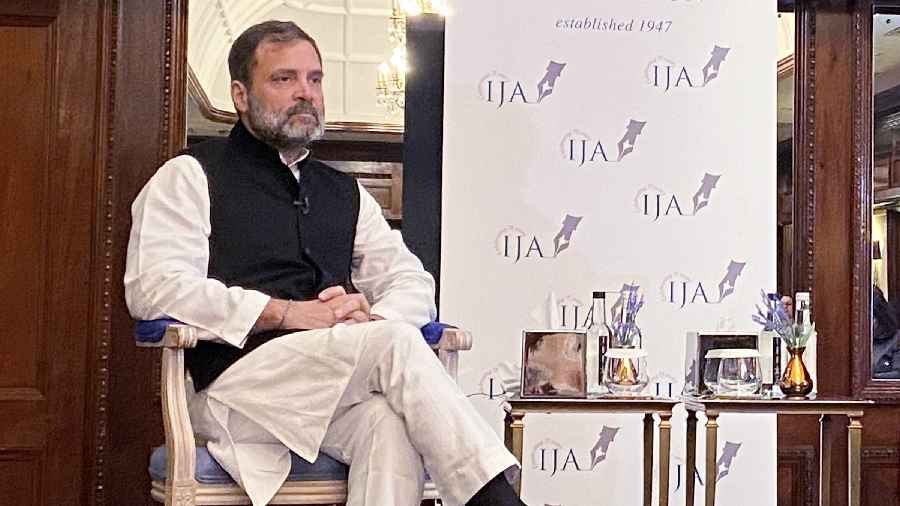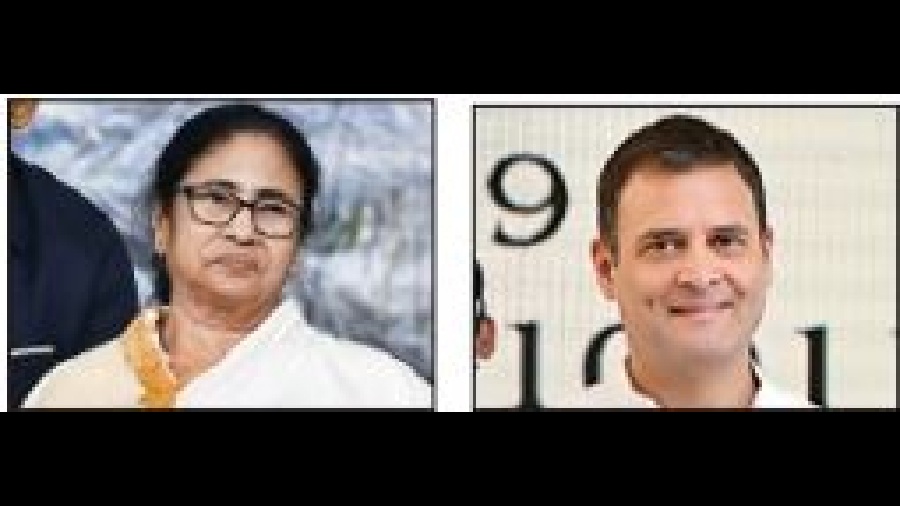Did Rahul Gandhi step beyond the limit during his trip to London and make himself liable for a range of crimes starting with sedition? Will the BJP follow through with the threat to have him suspended from Parliament because he made critical remarks on foreign shores?
The latest spot of bother for Gandhi came at the weekend when a police team turned up at his house to demand details about women who told him they had been raped. He had mentioned this during his lecture at Cambridge and had added that they had they were reluctant to go to the police because of the shame it could bring on them.
To be sure, Gandhi fired broadsides against the Government, the BJP and the RSS. “The institutional framework that is required for a democracy, parliament, a free press, the judiciary these are all under attack. We are facing an attack on the basic structure of Indian democracy,” he told the audience at Cambridge University where he had been invited to lecture. He described how more than one demonstration of parliamentarians ended with all of them being shoved into police vans and held for a few hours.
Gandhi had three major engagements in the UK. He had travelled there to speak at Cambridge. But he followed that up with meetings at international affairs think tank Chatham House in London and also chatted to the press at a meeting organised by the Indian Journalists’ Association there. On each occasion he dressed to fit the occasion. A suit and tie before the Cambridge University students, a bandhgala at Chatham House and kurta pyjama when facing the Indian journalists.
The fact was that Gandhi displayed an unusual mix of caution and candour at all his meetings. He didn’t hesitate to attack the government. “Travel in India and you can see what is being done to the Dalit community, to the tribal community, to the minorities. (There are) articles in the foreign press all the time that there is a serious problem with Indian democracy. The BJP is not interested in a conversation. They have decided they know what is going on in the country.”
He also ripped into the government’s use of agencies like the CBI and the Enforcement Directorate. “Ask any opposition leader how the agencies are used. My phone had Pegasus on it. That simply wasn’t happening when we were in power,” he insisted. The BJP has countered to this that a Supreme Court committee had found that Pegasus was not used. Several international tech experts have, however, said there was strong evidence that Pegasus was present on several phones that they examined. Besides that, Gandhi also brought up the string of criminal libel cases he’s facing.
Gandhi likes to talk about Indian democracy in roundabout terms and insists that it can only be thrive if there is “negotiation”. And he accuses Prime Minister Narendra Modi of not being in ‘negotiating’ mode. “(Democracy) is a negotiation between 1.4 billion people and that negotiation happens through institutions. My worry is that the architecture of that negotiation is being attacked and broken. The prime minister one day turns round and demonetises the Indian currency. The RBI (Reserve Bank of India) doesn’t know about it. Everything has been bypassed.” He added: “It’s the same with GST and how it was worked out.”
In his discussion about India, he climbed to metaphysical levels. “There are two philosophies in India. One believes in infinity that says you will live forever. The other says you don’t exist. India operates between these two.”
He was particularly emotional when talking about the marathon BJY that lasted for four-and-a-half months and the tremendous effort involved. Gandhi said they hadn’t really known what to expect when the core team of 125 started walking. Initially, they had expected crowds of about 3,000 or 4,000 would join them on any given day. Instead, on one occasion they were heading a procession of almost 100,000. “The number of people just spiralled,” he said.
The physical effort turned out to be far beyond anything Gandhi had anticipated. “We had no idea what we were getting ourselves into. I run 10km a day so I thought walking 30km a day can’t be that difficult. This was not just about distance. It was about the energy embedded in this thing,” he said. Gandhi also talked about how his knee began to trouble him so he would wake up in the morning and think, “only 3,500km left.”
His most startling personal discovery as that after walking 4,000km at a brisk pace from one end of the country to another he hadn’t lost an ounce of weight. “I put on a kilo after walking 4,000km,” he ruefully said, adding that: “Exercise doesn’t help you lose weight.’
At every level the BJY crossed all the boundaries that had been planned for. For a start, it was a security nightmare. But over the protests of his security men, Gandhi insisted that a clear space had to exist around him. Says Gandhi: “I came out with a concept I have to ensure the space in front of me is safe. Woman, handicapped, whoever comes into this space must feel they have come home. The moment they came up with making it a home they stopped being political discussions. A political idea became a personal idea. People started talking about things we never imagined they would talk about. People telling us the most personal things.” Two girls told him how they had been raped but said they couldn’t tell the police as they would be publicly shamed if they did.” This disclosure was one reason why the police turned up at his house on Sunday.
The greatest issue Gandhi says for the people he talked to across the country, was unemployment. Besides that, he says: “Everywhere we went people were speaking about climate change. But they were talking about it locally. The water is very polluted. They were not making the connection between the local problem and the global problem.”
As Gandhi told it to one audience after another in London, the Bharat Jodo Yatra (BJY)went beyond pure politics and was an almost mystical experience. The brutal physical effort had an almost mind-altering effect. “You started to hear not just with your ears. You started to hear with your hands, you started to listen with your eyes.”. Beyond that, he adds: “I started to go silent. It was like I was a dark lake and slowly I started to feel many things that I couldn’t feel before.
Did Gandhi cross the limit when criticising the government? What he said was nothing that a healthy democracy shouldn’t be able to take in its stride. Even more seriously, could he have libelled the government and its seniormost leaders? Take a look at the US where it’s held that public figures must be prepared to face attacks of all kinds against them. In the UK it’s much the same. Says Congress MP Manish Tiwari: “There is case law in England on utterances in public interest.” He adds that breach of privilege rules in India are “almost identical”. Gandhi has also written to the Lok Sabha Speaker Om Birla requesting time to speak in the House about his remarks in London.
Did Gandhi call for global powers to interfere in India? Not really. Certainly, Gandhi did note that the world should be concerned about the state and fate of Indian democracy. “Indian democracy is a public good. It is by far the world’s biggest democracy. Defending Indian democracy is about more than India. It is about defending the democratic system.”
He also lashed out sharply at Prime Minister Modi on the border issues with China. “They are sitting on 2,000sq km of our territory. And when they did it the prime minister said that not a single inch of Indian territory has been taken. The Chinese know they are sitting on our territory. The military knows it.”
During his public appearances in London, Gandhi did bring up Gautam Adani and his close ties with Narendra Modi. And the ruling party has successfully used Gandhi’s utterances in London to divert attention from Adani -- the fact is that the shouting matches in parliament have been led by the BJP. Gandhi and the rest of the opposition have fallen headlong into the ruling party’s trap.
The aftermath of Gandhi’s London talks has been revealing in other ways. Opposition leaders have shown little inclination to come to Gandhi’s aid. That almost certainly reveals how the Gandhis’ imperial style is coming in the way of any chance of opposition unity.
In the coming weeks we will see whether the BJP follows up on the demand that Gandhi should be suspended from Parliament. One recent cartoon shows a large hand over a startled-looking Gandhi and a voice saying: “You can’t talk in Parliament.” Gandhi replies with surprise: “But that’s what I said in London.”











